Sustainable Commodities
Sustainable Commodities: Transforming Global Supply Chains
In today’s increasingly environmentally conscious world, sustainable commodities have emerged as a critical component of global trade. These commodities—ranging from agricultural products to minerals and energy resources—are produced, processed, and traded with consideration for environmental integrity, social equity, and economic viability throughout their entire lifecycle.
What Makes a Commodity Sustainable?
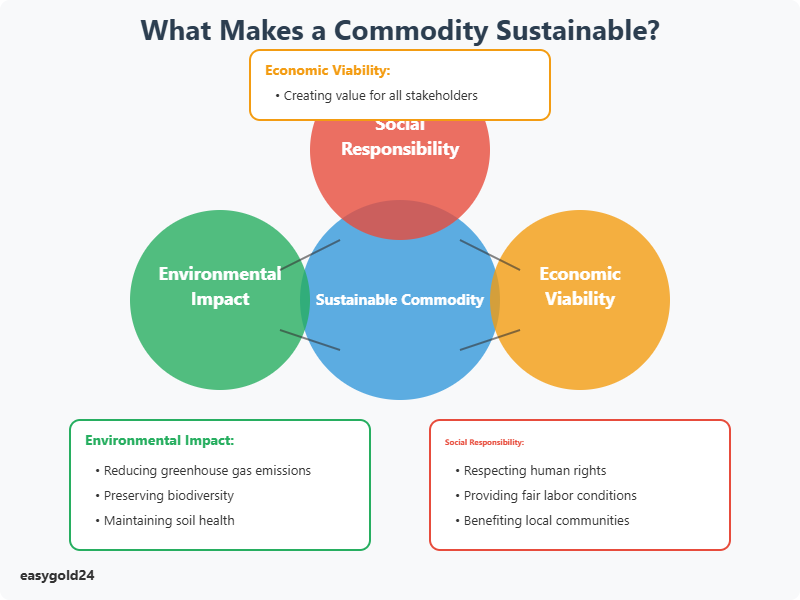
A sustainable commodity is produced and traded in a manner that:
1. Minimizes environmental impact by reducing greenhouse gas emissions, preserving biodiversity, maintaining soil health, and using water resources efficiently.
2. Ensures social responsibility through respecting human rights, providing fair labor conditions, and benefiting local communities.
3. Maintains economic viability by creating value for all stakeholders throughout the supply chain while remaining commercially competitive.
Key Categories of Sustainable Commodities
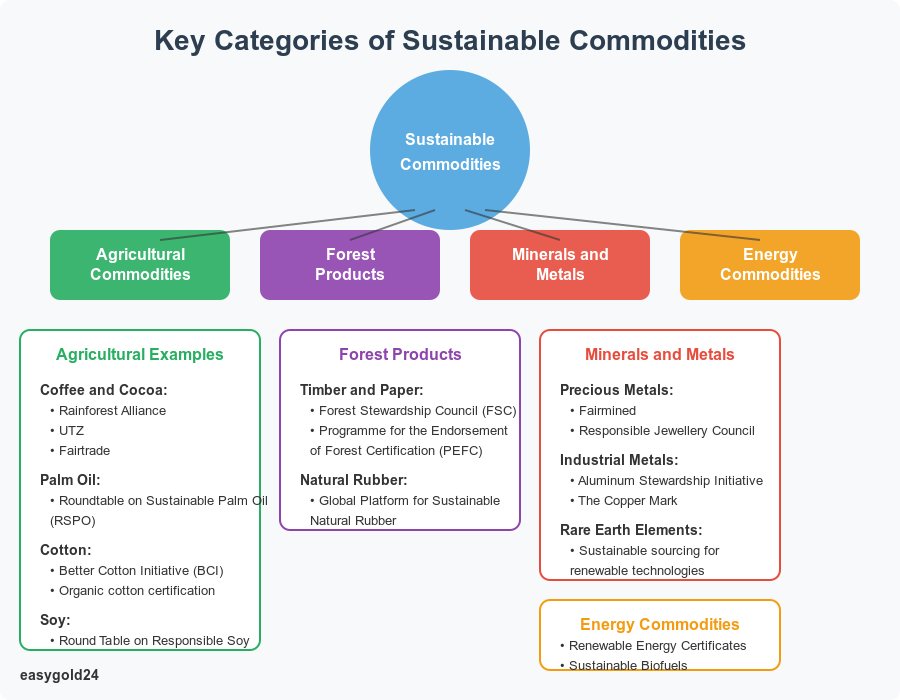
Agricultural Commodities
Agricultural commodities represent one of the largest sectors embracing sustainability practices.
Coffee and Cocoa: Sustainably grown coffee and cocoa focus on agroforestry systems that preserve biodiversity and soil health while providing fair compensation to farmers. Major certification systems include Rainforest Alliance, UTZ, and Fairtrade.
Palm Oil: Sustainable palm oil production addresses deforestation concerns through organizations like the Roundtable on Sustainable Palm Oil (RSPO). This organization certifies producers who avoid clearing primary forests, protect high conservation value areas, and respect indigenous land rights.
Cotton: Sustainable cotton initiatives such as the Better Cotton Initiative (BCI) and organic cotton certification promote reduced pesticide use, water efficiency, and improved labor conditions.
Soy: Given its role in deforestation, particularly in South America, sustainable soy production follows guidelines established by the Round Table on Responsible Soy (RTRS) and focuses on avoiding conversion of native ecosystems.
Forest Products
Timber and Paper: The Forest Stewardship Council (FSC) and Programme for the Endorsement of Forest Certification (PEFC) certify timber and paper products from responsibly managed forests, ensuring harvesting practices maintain forest health and biodiversity.
Natural Rubber: Sustainable natural rubber initiatives address deforestation and labor issues in rubber plantation management. Frameworks such as the Global Platform for Sustainable Natural Rubber establish standards for responsible production.
Minerals and Metals
Precious Metals: Initiatives like Fairmined and the Responsible Jewellery Council certify gold and silver produced with minimal environmental impact and under safe working conditions.
Industrial Metals: The Aluminum Stewardship Initiative (ASI) and the Copper Mark recognize sustainable practices in metal production, focusing on reducing carbon footprint, water usage, and waste.
Rare Earth Elements: Critical for renewable technologies, sustainable sourcing of rare earth elements focuses on reducing environmental damage from mining and processing operations.
Energy Commodities
Renewable Energy Certificates: These tradable commodities represent proof that electricity was generated from renewable sources such as wind, solar, or hydropower.
Sustainable Biofuels: Certified sustainable biofuels meet criteria ensuring they don’t compete with food production or contribute to deforestation.
Certification Standards and Frameworks
The integrity of sustainable commodity claims relies heavily on robust certification systems:
Third-Party Certification
Independent certification bodies verify compliance with established standards through audits and inspections. Major global frameworks include:
- Rainforest Alliance/UTZ: Focuses on biodiversity conservation and farmer livelihoods
- Fairtrade International: Emphasizes fair prices and community development
- Organic certifications: Verify production without synthetic inputs
- Forest Stewardship Council (FSC): Ensures responsible forest management
- Marine Stewardship Council (MSC): Certifies sustainable seafood
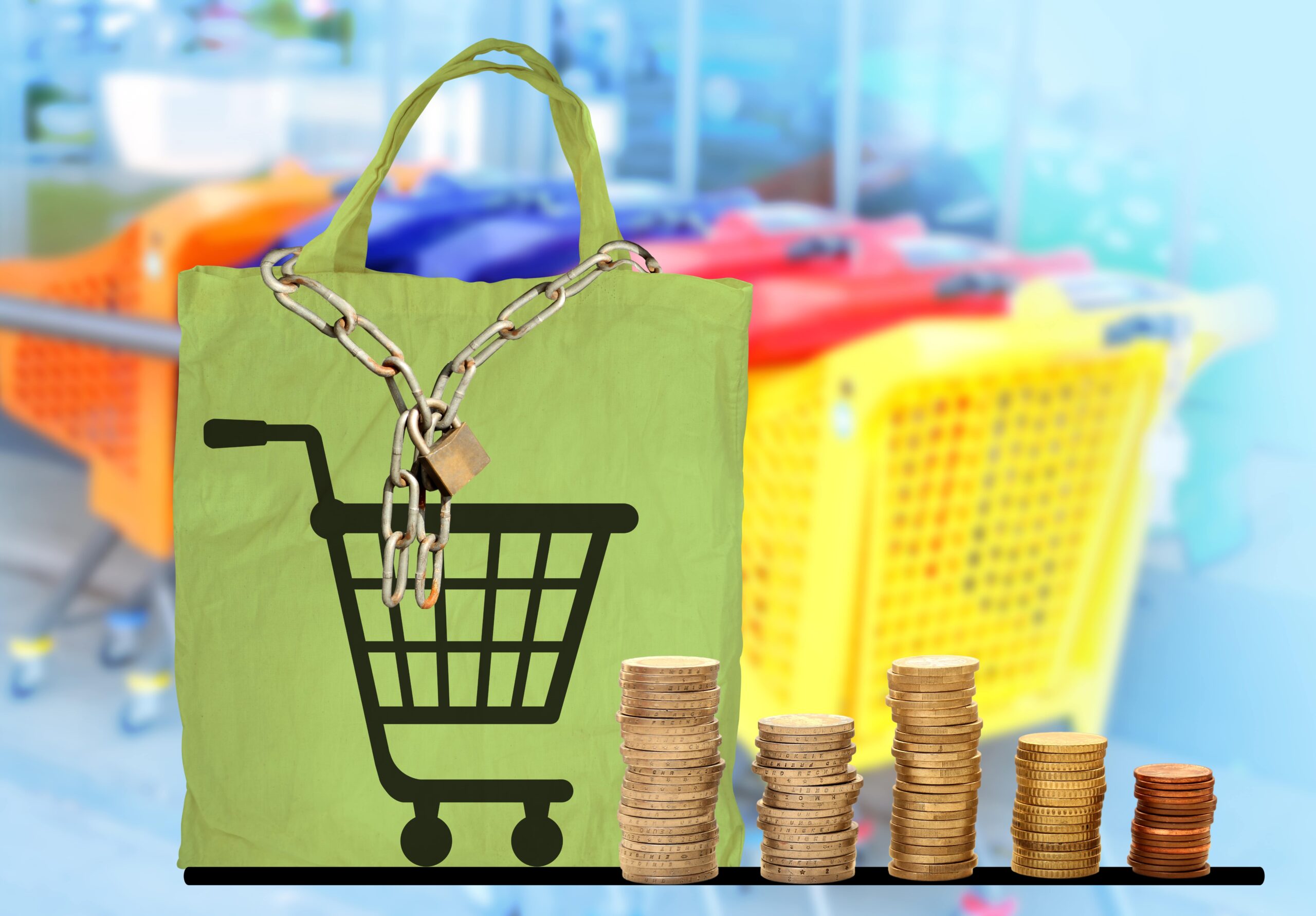
Corporate Frameworks
Many corporations have developed their own sustainability frameworks, including:
- Unilever’s Sustainable Agriculture Code
- Nestlé’s Responsible Sourcing Standard
- Walmart’s Project Gigaton
Multi-Stakeholder Initiatives
These initiatives bring together producers, buyers, NGOs, and governments:
- Roundtable on Sustainable Palm Oil (RSPO)
- Better Cotton Initiative (BCI)
- Global Coffee Platform
- Sustainable Apparel Coalition
Market Trends and Economic Impact
Growing Market Demand
The global market for certified sustainable commodities continues to expand:
- The organic food market reached $187 billion globally in 2023
- Certified sustainable palm oil accounts for approximately 20% of global palm oil production
- FSC-certified forest area exceeds 200 million hectares worldwide
- Fairtrade certified product sales exceed $9 billion annually
Price Premiums and Producer Benefits
Sustainable commodities often command price premiums, though these vary considerably:
- Organic produce premiums range from 10-100% above conventional prices
- Fairtrade coffee premiums average $0.20 per pound plus a minimum price floor
- FSC-certified timber premiums range from 5-25% depending on market conditions
These premiums help offset the additional costs of sustainable production, although they don’t always fully compensate for the investment required.
Corporate Commitments
Major corporations increasingly commit to sourcing sustainable commodities:
- More than 500 companies have made zero-deforestation commitments
- Over 300 companies have committed to 100% sustainable palm oil
- Major retailers increasingly require verification of sustainable production practices
Challenges in Sustainable Commodity Systems
Implementation Barriers
Multiple factors hinder wider adoption:
- Transition costs: Significant upfront investments are required to shift from conventional to sustainable production methods
- Technical knowledge gaps: Producers may lack access to necessary expertise and training
- Scale limitations: Certification systems designed for large producers may be impractical for smallholders
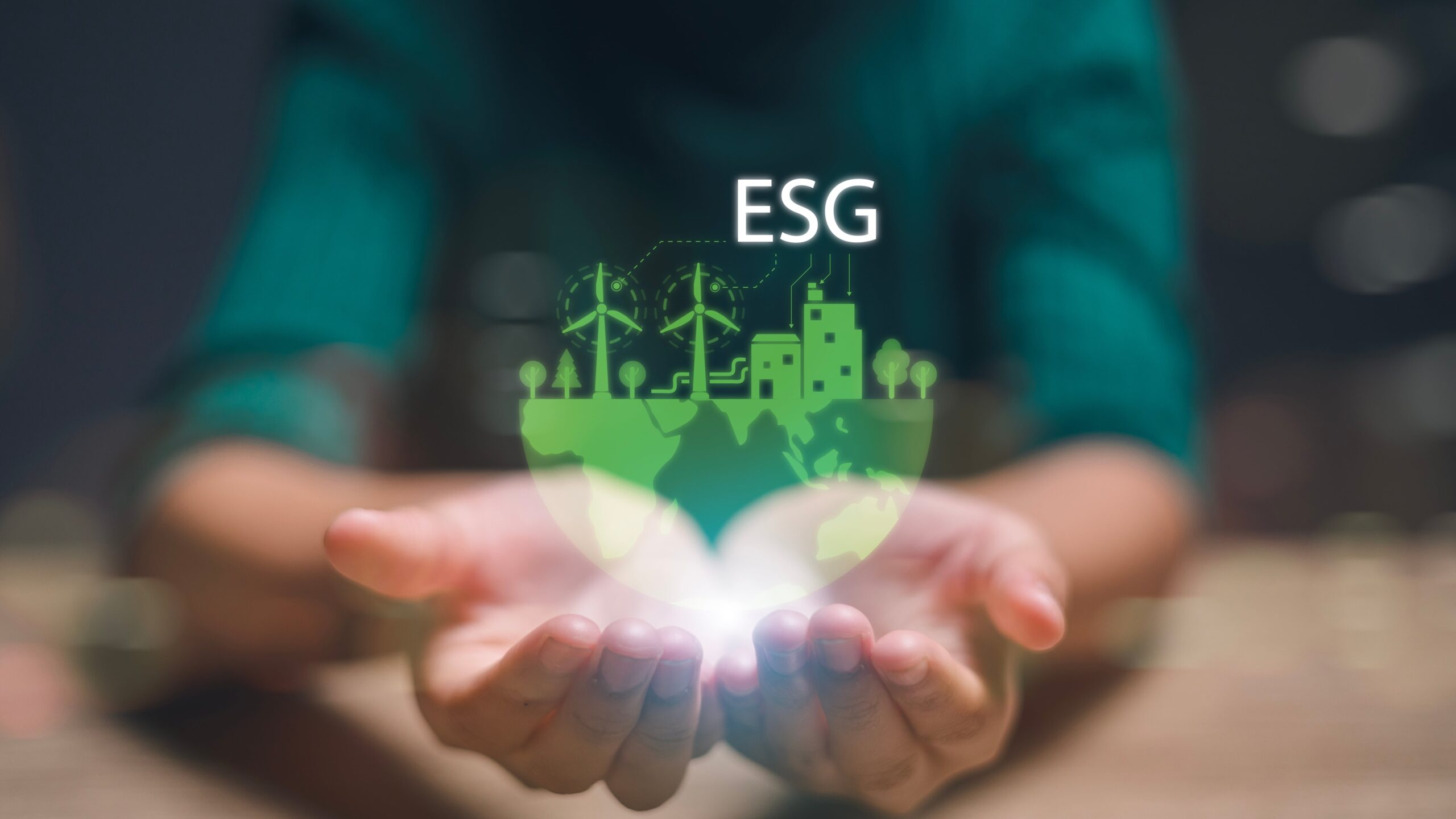
Verification and Traceability
Ensuring claims of sustainability requires robust traceability systems:
- Complex supply chains: Multiple intermediaries between producer and consumer complicate tracking efforts
- Limited transparency: Information asymmetry between supply chain actors creates verification challenges
- Fraud risk: Increasing value of sustainable commodities creates incentives for false claims and greenwashing
Market Penetration
Despite growth, sustainable commodities remain a fraction of total production:
- Less than 25% of global coffee production is sustainably certified
- Sustainable palm oil represents approximately 20% of global production
- Certified sustainable timber accounts for roughly 30% of commercially harvested wood
Innovations and Future Directions
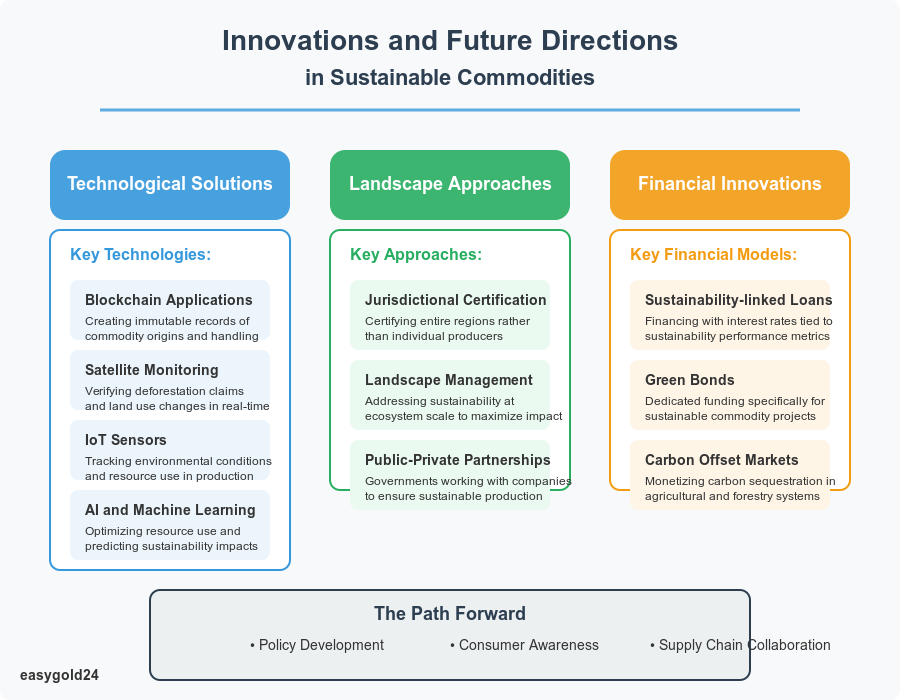
Technological Solutions
New technologies are revolutionizing sustainable commodity systems:
- Blockchain applications: Creating immutable records of commodity origins and handling throughout supply chains
- Satellite monitoring: Verifying deforestation claims and land use changes in real-time
- IoT sensors: Tracking environmental conditions and resource use in production areas
- AI and machine learning: Optimizing resource use and predicting sustainability impacts across value chains

Landscape and Jurisdictional Approaches
Moving beyond individual farms or plantations:
- Jurisdictional certification: Certifying entire regions rather than individual producers
- Landscape management: Addressing sustainability at ecosystem scale to maximize impact
- Public-private partnerships: Governments working with companies to ensure sustainable production across territories
Financial Innovations
New financial models support sustainable commodity production:
- Sustainability-linked loans: Financing with interest rates tied to sustainability performance metrics
- Green bonds: Dedicated funding specifically for sustainable commodity projects
- Carbon offset markets: Monetizing carbon sequestration in agricultural and forestry systems
The Path Forward
The future of sustainable commodities depends on several critical factors:
Policy Development
- Government regulations: Mandatory due diligence requirements for supply chains
- Import restrictions: Limiting market access for unsustainably produced commodities
- Subsidies and incentives: Financial support for sustainable production methods
Consumer Awareness
- Transparent labeling: Clear information about sustainability attributes of products
- Education campaigns: Informing consumers about the impact of their purchasing choices
- Price sensitivity management: Addressing the “green premium” barrier to wider adoption
Supply Chain Collaboration
- Pre-competitive industry coalitions: Shared approaches to common sustainability challenges
- Technology sharing: Democratizing access to sustainability tools and methodologies
- Capacity building: Investing in producer knowledge and resources to enable transition
Sustainable Commodities: Transforming Global Supply Chains
Sustainable commodities are reshaping the way supply chains operate, offering both challenges and immense opportunities. As global demand for eco-friendly and ethically sourced products rises, companies are increasingly committing to sustainable practices. This shift is driven by a combination of consumer expectations, corporate responsibility, and evolving regulations.
The transition to sustainable commodities is not just an environmental necessity, but also an economic advantage. Businesses with transparent, resilient supply chains focused on sustainability are better equipped to mitigate risks, comply with regulations, and meet the growing demand for ethical products. These companies are positioned for long-term success, ensuring continued access to critical resources while fulfilling market demands.
As the market for sustainable commodities grows, the most successful strategies will be those that balance environmental impact, economic feasibility, and social responsibility. This balanced approach ensures that all stakeholders within global supply chains benefit, while preserving natural resources for future generations.
Hartmann & Benz recognizes the importance of sustainability and is actively shaping its future by going public on the OTCQB market. As we move forward with our share listing and the launch of the EasyGold security token, we are committed to offering innovative investment solutions that align with sustainable growth. Through these efforts, we invite investors to participate in a forward-thinking opportunity that benefits both the environment and their portfolios. Stay informed about our progress and explore how you can be part of this exciting journey.
